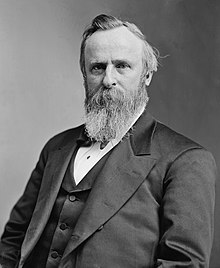Rutherford Birchard Hayes (/ˈrʌðərfərd/; October 4, 1822 – January 17, 1893) was an American politician and attorney who served as the 19th president of the United States from 1877 to 1881, after serving in the U.S. House of Representatives and as governor of Ohio. A lawyer and staunch abolitionist, he had defended refugee slaves in court proceedings during the antebellum years. He negotiated the political agreement to end federal support of Reconstruction.
An attorney in Ohio, Hayes served as city solicitor of Cincinnati from 1858 to 1861. At the start of the Civil War, he left a fledgling political career to join the Union Army as an officer. Hayes was wounded five times, most seriously at the Battle of South Mountain in 1862. He earned a reputation for bravery in combat and was promoted to the rank of brevet major general. After the war, he served in Congress from 1865 to 1867 as a Republican. Hayes left Congress to run for governor of Ohio and was elected to two consecutive terms, from 1868 to 1872. He served half of a third two-year term from 1876 to 1877 before being sworn in as President.
In 1876, the Electoral College made Hayes president in one of the most contentious elections in U.S. history. He lost the popular vote to Democrat Samuel J. Tilden, but won an intensely disputed electoral-college vote after a Congressional commission awarded him 20 contested electoral votes in the Compromise of 1877, whereby the Democrats acquiesced to Hayes's election on the condition that he withdraw remaining U.S. troops protecting Republican officeholders in the South, thus officially ending the Reconstruction era.
Hayes believed in meritocratic government and in equal treatment without regard to wealth, social standing or race. He ordered federal troops to guard federal buildings and in doing so restored order during the Great Railroad Strike of 1877. Hayes implemented modest civil-service reforms that laid the groundwork for further reform in the 1880s and 1890s. He vetoed the Bland–Allison Act of 1878, which put silver money into circulation and raised nominal prices, insisting that maintenance of the gold standard was essential to economic recovery. Hayes's policy toward western Indians anticipated the assimilationist program of the Dawes Act of 1887.
Hayes kept his pledge not to run for reelection, retired to his home in Ohio, and became an advocate of social and educational reform. Biographer Ari Hoogenboom has written that Hayes's greatest achievement was to restore popular faith in the presidency and to reverse the deterioration of executive power that had set in after Abraham Lincoln's assassination in 1865. Supporters have praised his commitment to civil-service reform and the defense of civil rights, but historians and scholars generally rank Hayes as an average to slightly below-average president.
Last Updated: June 9, 2021

























